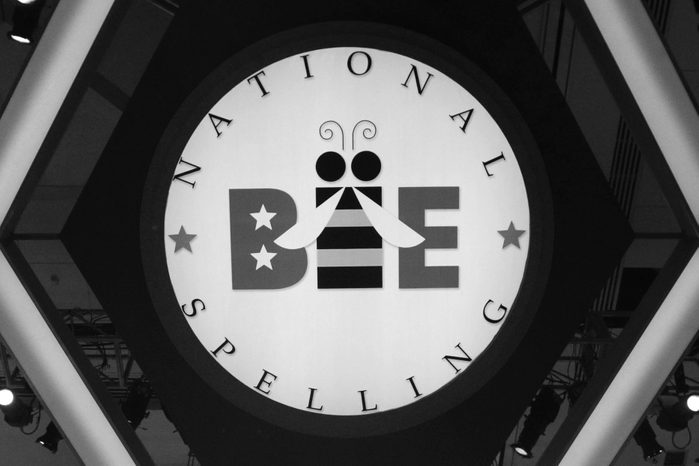
Bee’s the word!
The Scripps National Spelling Bee got its start in 1925, and since then, the competition has challenged participants to remember exactly how to spell some of the hardest words out there. And we’re not just talking about “grey or gray” and other commonly misspelled words—these students are tasked with spelling some real vocab doozies. If you think you’ve seen hard spelling bee words before, buckle up for this list, because these are some of the hardest winning words from the competition.
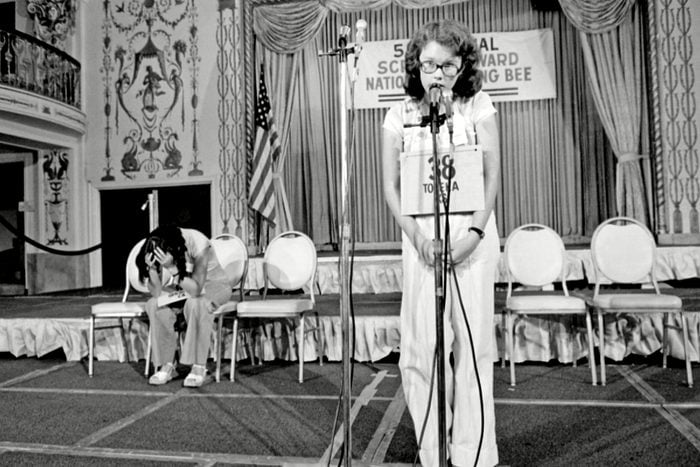
Winning word: albumen
Year: 1928
How to say it: “al-byoo-muhn”
What it means: Egg white, as well as a type of protein found in egg whites and milk
Sentence containing the word: “Well-beaten albumen is the key to impressive meringue.”
Who won: Betty Robinson, a 13-year-old from Indiana
Looking to beef up your vocabulary? These fancy words will make you sound smarter.
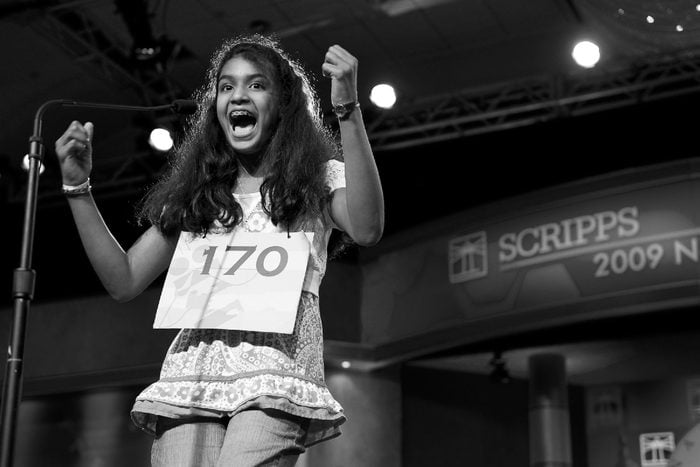
Winning word: asceticism
Year: 1929
How to say it: “uh–set–uh-siz-uhm”
What it means: The practice of avoiding indulgences and temptations, usually for religious reasons
Sentence containing the word: “Priests practice asceticism in a display of worship.”
Who won: Virginia Hogan, a 12-year-old from Nebraska
There’s no doubt grammar can be a bit confusing—here are some of the most confusing grammar rules out there.

Winning word: soubrette
Year: 1953
How to say it: “soo-bret“
What it means: A high female vocal range, or an actress in an opera with such a vocal range
Sentence containing the word: “Suzanne in Le Mariage de Figaro is possibly the most famous soubrette.”
Who won: Elizabeth Hess, a 13-year-old from Arizona
Want to see if you’re a real word pro? Test your skills with these word puzzles.
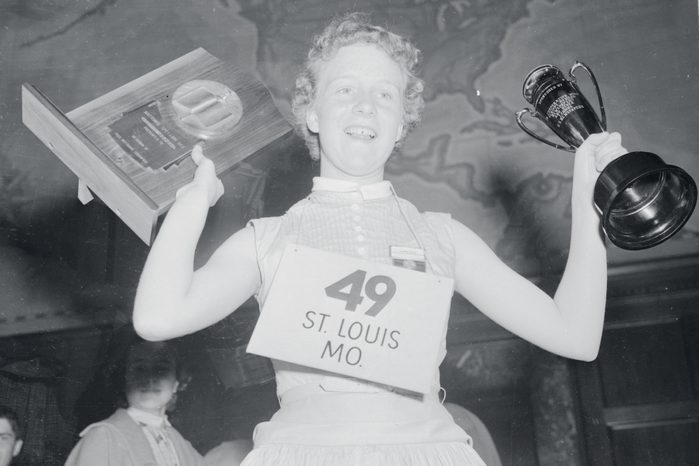
Winning word: crustaceology
Year: 1955
How to say it: “crus-tay-shee-aw-lo-jee”
What it means: The study of crustaceans such as crabs and shrimp
Sentence containing the word: “I’m very interested in marine biology, specifically crustaceology.”
Who won: Sandra Sloss, a 13-year-old from Illinois
Another tricky word to spell: traveled—or is it travelled?
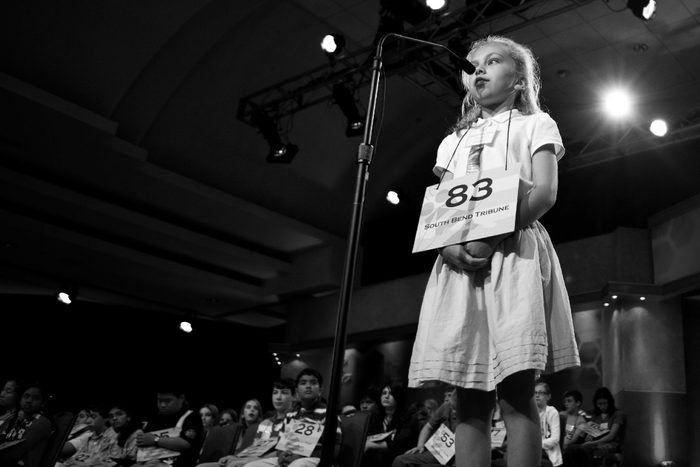
Winning word: interlocutory
Year: 1969
How to say it: “in-ter-lok-yuh-tawr-ee”
What it means: Given during the course of a legal action
Sentence containing the word: “Rather than awaiting trial, consider an interlocutory appeal.”
Who won: Susan Yoachum, a 14-year-old from Texas
Find out how many of these hard tongue twisters you can say without stumbling.
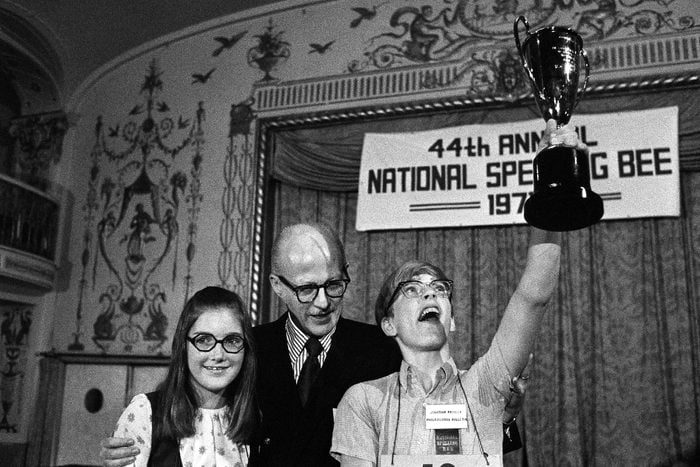
Winning word: shalloon
Year: 1971
How to say it: “sha-loon“
What it means: A type of twilled fabric
Sentence containing the word: “The material used to line clothing is more often than not shalloon.”
Who won: Jonathan Knisely, a 12-year-old from New Jersey
Not sure when to use laying or lying? Don’t worry—here’s the difference between the two words.
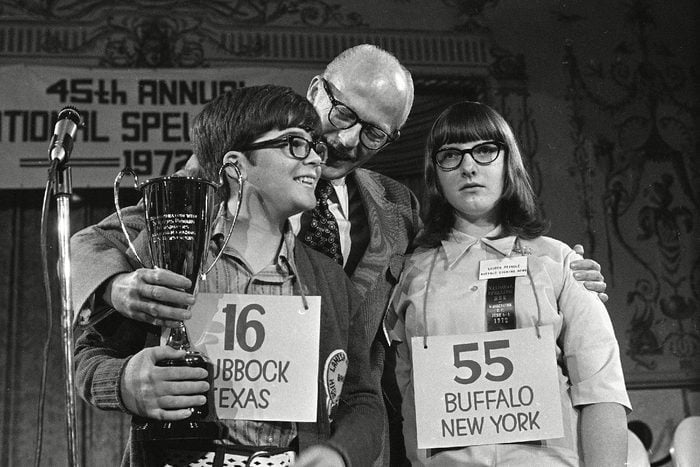
Winning word: macerate
Year: 1972
How to say it: “mas–uh-reyt”
What it means: To soften (usually food) by soaking in liquid
Sentence containing the word: “The recipe calls for sugar and water to mix and macerate the strawberries.”
Who won: Robin Kral, a 14-year-old from Texas
Here are the words and phrases you may be using all wrong.

Winning word: hydrophyte
Year: 1974
How to say it: “hahy-druh-fahyt”
What it means: An aquatic plant, one that grows only on or in water
Sentence containing the word: “A few hydrophytes would really liven up the fish tank.”
Who won: Julie Ann Junkin, a 12-year-old from Alabama
How many of these funny words have you heard before?

Winning word: maculature
Year: 1979
How to say it: “mac-yoo-luh-chur”
What it means: In art, a printing impression made to remove excess ink
Sentence containing the word: “Any bookbinder worth their salt will know about maculatures!”
Who won: Katie Kerwin McCrimmon, a 13-year-old from Colorado
Calling all grammar nerds: These grammar memes are sure to crack you up.

Winning word: elegiacal
Year: 1988
How to say it: “el-i-jahy–uh-kuhl”
What it means: Sorrowful or lamenting
Sentence containing the word: “The movie score was rather elegiacal—I was sobbing the whole time!”
Who won: Rageshree Ramachandran, a 13-year-old from California
Don’t forget to browse through these examples of onomatopoeia you may not have seen before.

Winning word: spoliator
Year: 1989
How to say it: “spoh-lee-eyt-uhr”
What it means: Someone who plunders or robs
Sentence containing the word: “The spoliator has made off with our spoils once again.”
Who won: Scott Isaacs, a 14-year-old from Colorado
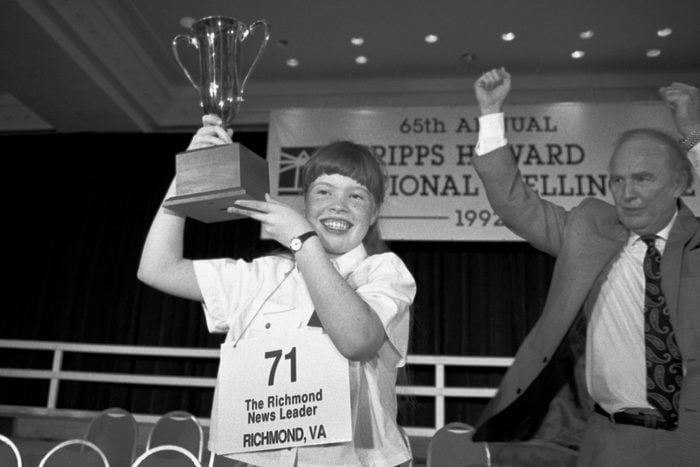
Winning word: lyceum
Year: 1992
How to say it: “lahy-see–uhm”
What it means: An institution or building that hosts lectures and other educational programs
Sentence containing the word: “I just went to a poetry reading at that lyceum last week.”
Who won: Amanda Goad, a 13-year-old from Virginia
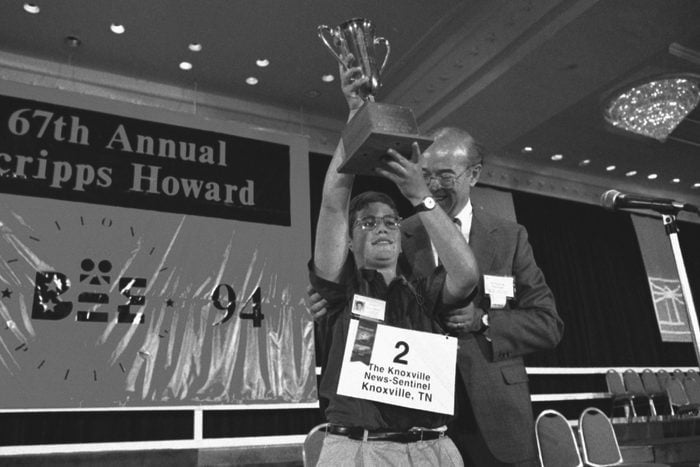
Winning word: antediluvian
Year: 1994
How to say it: “an-tee-di-loo-vee-uhn”
What it means: Taking place before the Great Flood in the Bible, or extremely old-fashioned
Sentence containing the word: “I enjoy having a door opened for me once in a while—consider me antediluvian!”
Who won: Ned G. Andrews, a 13-year-old from Tennessee
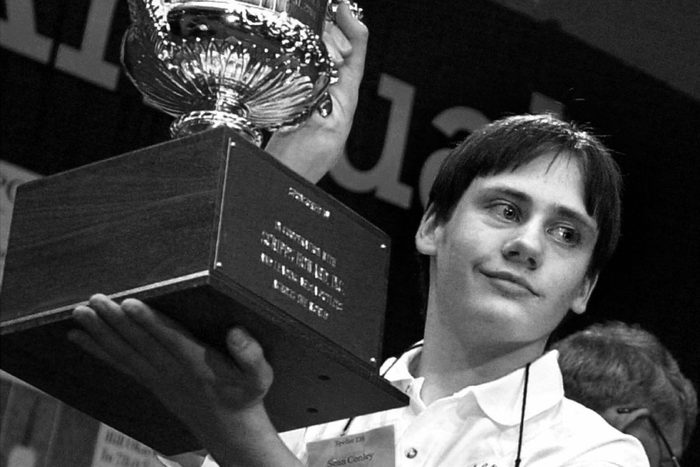
Winning word: succedaneum
Year: 2001
How to say it: “suhk-si-dey-nee-uh m”
What it means: A substitute or replacement, usually for medicine
Sentence containing the word: “Even though the man ordered roses for his wife, the florist decided the succedaneum of daisies would have to do.”
Who won: Sean Conley, a 13-year-old from Minnesota
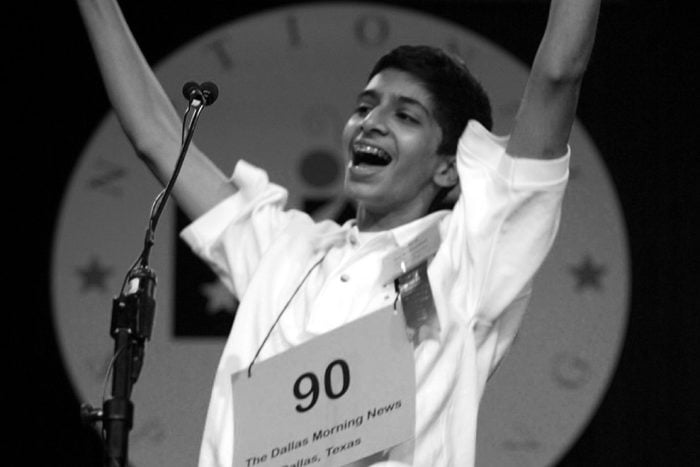
Winning word: pococurante
Year: 2003
How to say it: “poh-koh-koo–ran-tee”
What it means: Uncaring, apathetic (as well as a person with those qualities)
Sentence containing the word: “If a young man grew up being yelled at all the time, it is quite expected for the man to have a pococurante demeanor toward people screaming.”
Who won: Sai R. Gunturi, a 13-year-old from Texas
Feeling funny? These funny palindrome sentences will make you chuckle.

Winning word: appoggiatura
Year: 2005
How to say it: “uh-poj-uh–too-ruh”
What it means: A music note played as an embellishment on the main beat
Sentence containing the word: “An appoggiatura places emphasis on the grace note.”
Who won: Anurag Kashyap, a 13-year-old from California
Did you know this is how you’re supposed to pronounce “Worcestershire”?
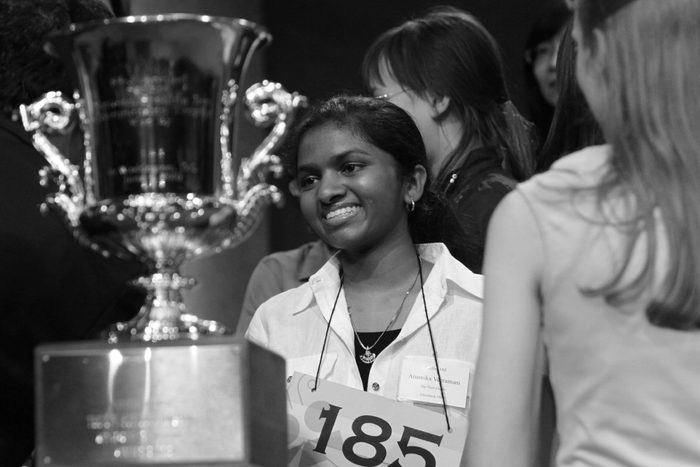
Winning word: stromuhr
Year: 2010
How to say it: “straw-muhr”
What it means: A medical instrument that determines the amount of blood flowing through a vein or artery
Sentence containing the word: “This prognosis might require a stromuhr.”
Who won: Anamika Veeramani, a 14-year-old from Ohio

Winning word: guetapens
Year: 2012
How to say it: “get-uh-paw”
What it means: A trap or a snare
Sentence containing the word: “The opposing team fell for our guetapens, and it was all over.”
Who won: Snigdha Nandipati, a 14-year-old from California
By the way, this is why some English words have silent letters in them.
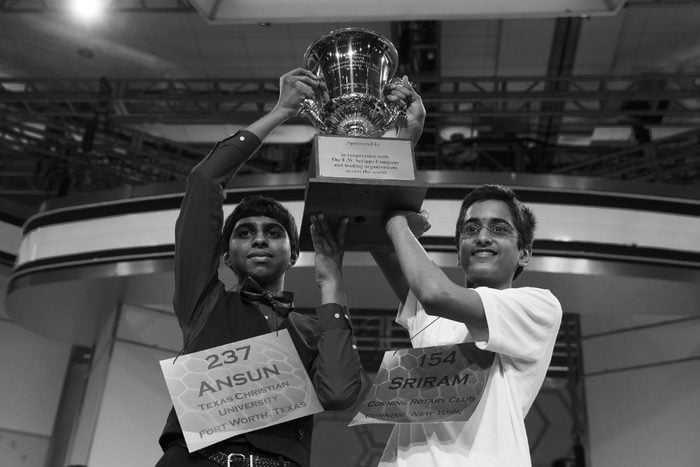
Winning words: feuilleton + stichomythia
Year: 2014
How to say them: “foi-yuh–tawn” + “stik-uh–mith-ee-uh”
What they mean: A part of a newspaper for fiction, essays, and other lighter reading + A Greek drama technique where two characters speak alternately
Sentences containing the words: “I love the Times section for feuilleton.” + “The stichomythia in Oedipus is unparalleled.”
Who won: Ansun Sujoe, a 13-year-old from Texas, and Sriram Hathwar, a 14-year-old from New York, tied for first place after exhausting the entire list of words

Winning words: scherenschnitte + nunatak
Year: 2015
How to say them: “shay-ren-shnit-tuh” + “nuhn–uh-tak”
What they mean: The artistic technique of cutting paper to form a symmetrical design + A peak of rock above an icy or snowy surface
Sentences containing the words: “Patience, practice, and a steady hand are essential for this craft, as most scherenschnitte designs are extremely elaborate.” + “At last we reached the top of the Crean Glacier, at a broad pass beside a striking nunatak.”
Who won: Gokul Venkatachalam, a 14-year-old from Missouri, and Vanya Shivashankar, a 13-year-old from Kansas, tied for first place after exhausting the entire list of words
Did you know the most complicated word in the English language is only three letters long?
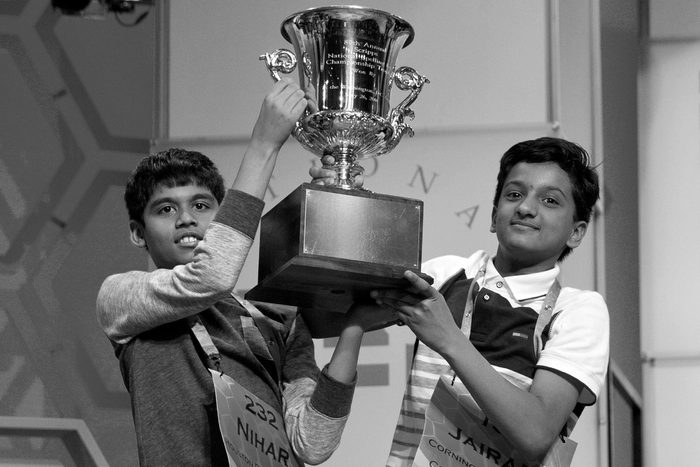
Winning words: feldenkrais + gesellschaft
Year: 2016
How to say them: “fell-den-krice” + “guh-zell-shawft”
What they mean: A method of exercise therapy that emphasizes connections between the brain and body + Social relationships based on duty or obligation, not camaraderie
Sentences containing the words: “A little feldenkrais will have you fixed up in no time.” + “It’s less a friendship and more so gesellschaft.”
Who won: Nihar Janga, an 11-year-old from Texas, and Jairam Hathwar, a 13-year-old from New York, tied for first place after exhausting the entire list of words
Scrabble fans: These little-known words can help you win the game!

Winning word: marocain
Year: 2017
How to say it: “mar–uh-keyn”
What it means: A type of fabric made from silk or wool
Sentence containing the word: “It’s a dress made from the most beautiful marocain I’ve ever seen.”
Who won: Ananya Vinay, a 12-year-old from California, became the first solo winner since 2013!

Winning word: koinonia
Year: 2018
How to say it: “koy-no-nee-a”
What it means: An intimate religious experience or spiritual connection
Sentence containing the word: “I’m going away next week on a little koinonia.”
Who won: Karthik Nemmani, a 14-year-old from McKinney, Texas
An interesting fact about the 2019 history-making competition: That year, crazily enough, didn’t really have a winning word. A full eight students were declared co-winners after completely running out the list of challenging spelling bee words without a single mistake. Must’ve been a pretty sharp field, with hard spelling bee words like “auslaut” and “erysipleas” to contend with.
Sources:
- Scripps National Spelling Bee
- Vox: “The 2019 National Spelling Bee ended in an unprecedented 8-way tie”
